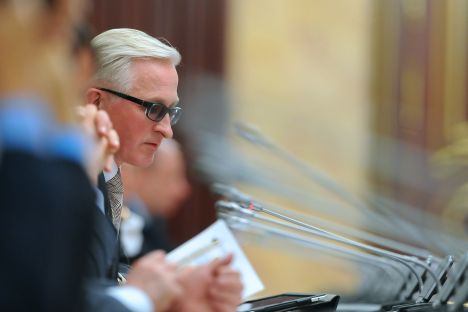Experts warn of new economic crisis

Alexander Shokhin, president of the Russian Union of Industrialists and Entrepreneurs, argues that the state will have to postpone plans to buy stakes in partially privatized energy companies in order to shore up the economy in preparation for the cr
Russian officials and experts warn that the next wave of the global financial crisis is imminent and that Russia needs to prepare. Alexander Shokhin, president of the Russian Union of Industrialists and Entrepreneurs, adds that the situation is more challenging for Russia since the country must prepare for this dire economic period while finalizing its accession to the WTO. Shokhin argues that the state will have to postpone plans to buy stakes in partially privatized energy companies in order to shore up the economy in preparation for the crisis. The government has implied that until the start of 2015, Rosneftegaz would be acting as an investor in the fuel and energy companies in which the state will privatize certain stakes, which means that the state would be buying the assets it plans to put up for sale.
Related:
Russia tightens belts for possible downturn
Vladimir Putin: G20 faces the global economy
Will Putin 2.0 mean a return to the prosperity of the 2000s?
“Under the circumstances, it is not wise to spend budget money on acquiring control in the fuel and energy complex,” Shokhin said, adding that such budget spending was an “unnecessary luxury.” He is certain that the government could cushion the impact of the new crisis if it channeled the dividends from state companies into the real sector. Shokhin said that the only way to save the national economy and business was to lower administrative barriers, slash insurance payments and mitigate tax policy. Agriculture, the forestry and textile industries, mechanical engineering and the car industry are in the risk zone now, and the government should be looking for appropriate ways to support them, according to Shokhin.
Igor Nikolaev, director of the strategic analysis department at FBK, agrees with the Shokhin. Nikolaev argues that the new crisis will be manifested gradually and it is crucial that, during this period, the state provide targeted support not only for lobbies, but also small business. “So far, we have observed levers for putting pressure on business in the form of increased social and insurance payments,” Nikolaev said, adding that only big companies are capable of surviving under this pressure. “The social burden has increased by 2-3 percent, but social payments could be further increased by 15 percent by the end of the year. This approach suggests that the state has safeguarded itself, not business,” Nikolaev said.
Meanwhile, Vladimir Yakunin, head of Russian Railways, announced that state companies are already working on programs to address the crisis. “They are still cautious when speaking about a second wave of the crisis; we were talking about it four years ago. However, as soon as current trends emerged, we reestablished the anti-crisis team to work on an anti-crisis program,” Yakunin said.
Alfa-Bank cites aggravations in the national economy in its forecasts of an imminent crisis. The bank in particular notes GDP expansion. Whereas the World Bank originally hoped for a 4 percent GDP growth in Russia this year, analysts doubt that it will exceed 3.2 percent.
According to Alfa-Bank chief economist Natalia Orlova, the only way to address the crisis effectively is to increase internal competitiveness. She argues that the new crisis will call for less interference by the state. “We live in a situation in which business must survive independently – the state has provided it with the relevant framework. Moreover, the state budget is limited now and, unlike in 2008, there is no longer any money to spare,” Orlova said.
The article is abridged and first published in Russian in the Izvestia newspaper.
All rights reserved by Rossiyskaya Gazeta.
Subscribe
to our newsletter!
Get the week's best stories straight to your inbox